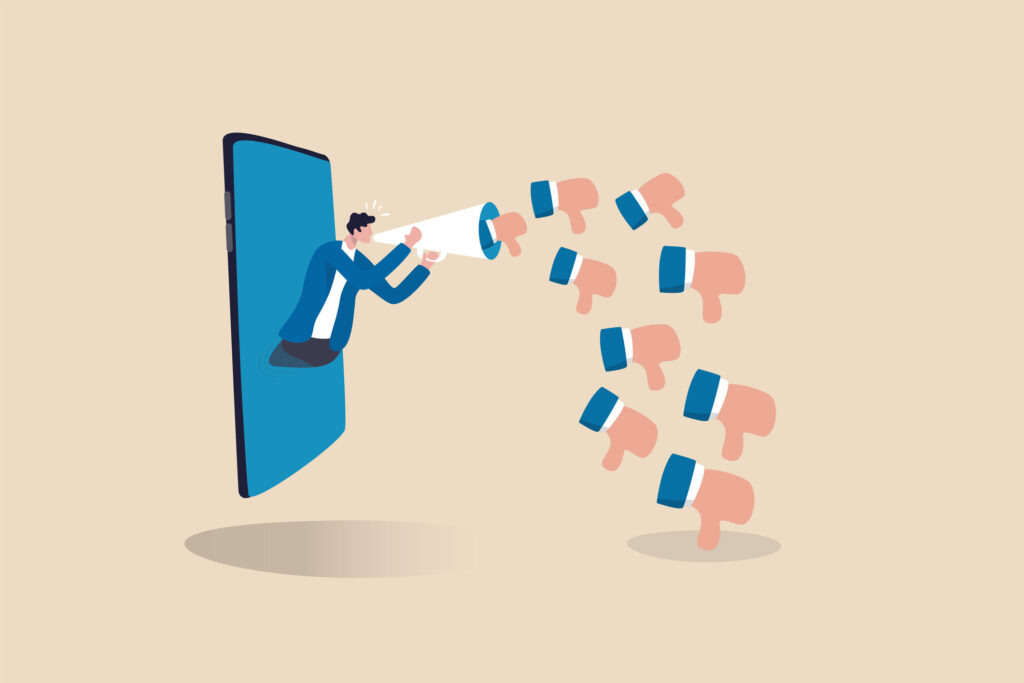Volcanoes are erupting in The Philippines, but on-fire Australia received some welcome rain. The Iran war cries have been called off and The Donald’s military powers are about to be hamstrung by the Senate. Meanwhile, his impeachment trial is starting, and we’re all on Twitter for a front-row seat.
Op-ed: More speech, not bans, is the lasting solution to hate speech
Is deplatforming individuals like Donald Trump, Kanye West, and Andrew Tate more harmful than helpful?

Rapper Kanye West’s recent suspensions from Twitter and Instagram for hate speech policy violations is only the latest example of high-profile personalities running afoul of Big Tech. Last month, Andrew Tate, a popular social media influencer known for his misogyny, was also banned from TikTok, Facebook, Instagram, and later YouTube for violating the policies of the social media companies. The string of bans followed earlier suspensions from Twitter.
In Nigeria, where I live, many people didn’t know who Tate was before the bans. Being the proudly conservative population that we are, hearing the news made a lot of people curious about him. Once acquainted, many of them agreed with his misogynistic views and the use of violence against women. Some of them found in Tate a new hero, one who shared their “real” views, and who was being silenced by a dangerous elite. Similar to West’s conspiracy-theory-style claims that Jewish people have “tried to black ball anyone whoever opposes your agenda,” they argued that the efforts to silence Tate only strengthened their case that he was right. I think it was a comfortable way for them to revolt—a revolt that didn’t require any change or growth on their part. I asked myself, Did deplatforming Tate really stop the spread of his opinions, or did it make things worse?
A few days after the January 6 riots in the United States, Donald Trump was suspended permanently from Twitter. By early June, Trump’s earlier suspensions from Facebook and Instagram were upheld by Meta’s Oversight Board, valid until 2023. Meta also indicated that there would be heightened penalties for public figures during times of civil unrest and ongoing violence. There was indeed clear evidence that Trump’s tweets influenced the riots. More generally, it has been shown that online hate speech has increased on social media against minorities and underrepresented groups, and that this hateful speech has psychological effects on those targeted. Still, I objected to Tate’s and Trump’s bans being either long-term or permanent.
In Nigeria, people get beaten and burned to death for blasphemy. Presently, the situation is so bad that it is observable not only in the parts of Nigeria where Sharia law is practiced, but also under the criminal law that gives states like Lagos State, a non-Sharia state, the freedom to criminalize blasphemous utterances. So I know the potential end-game of a society that starts to question the value of free speech.
There have been many attempts by the authoritarians in my country to silence dissenting voices on social media under the guise of regulating hate speech. In 2019, the Nigerian Senate proposed two bills—the National Commission for the Prohibition of Hate Speeches and the Protection from Internet Falsehood and Manipulation and other Related Offences—that would have given the government powers to shut down the internet and regulate social media. The bills would have also made criticizing the government punishable with penalties of up to three years in prison and “hate speech” punishable by life imprisonment or death.
Both bills were eventually dropped after being met with public outrage, but they were followed up earlier this year with attempts to insert deplatforming and social media regulation clauses into other bills or codes. These include the National Information Technology Development Agency’s (NITDA) draft Code of Practice, which would grant government agencies the power to order than an online platform take down content at the whim of the agencies within 24 hours, and the proposed National Electoral Offences Commission Bill, which calls for up to 10 years imprisonment for hate speech. Nothing more has been heard of the NITDA Code following critical review by civil society stakeholders, while the National Electoral Offences Commission Bill is still being pushed to be made into law before the general elections next year.
Efforts to stamp out critical views have not been limited to legislation, either. From June 5, 2021, to January 13, 2022, the president of Nigeria, Muhammadu Buhari, banned Twitter in the country, ostensibly for deleting an inciting post he had made. Most Nigerians understood, however, that President Buhari banned Twitter because it was strategic in mobilizing the 2020 protests against police brutality and bad governance—a movement identified online by the hashtag #EndSARS, in reference to Nigeria’s reportedly abusive Special Anti-Robbery Squad (SARS) police unit.
In August 2021, Nigeria’s Minister of Information and Culture, Lai Mohammed, told the state news content provider News Agency of Nigeria that the federal government “will not rest until we regulate the social media.” Mohammed’s comments suggest that regulating social media is the obvious solution to countering hate speech, but that is neither agreed-upon nor self-evident. The United Nations Strategy and Plan of Action on Hate Speech, for example, specifies that “we need to know more to act effectively [on hate speech]—this calls for coordinated data collection and research, including on the root causes, drivers and conditions conducive to hate speech.” To reach an effective solution, a problem’s causes must first be known.
This is why I am cautious about implementing bans even for individuals like Tate or Trump—support for them is often held without considering the implications such bans could have on society over the long run. Banned people can find other, more dangerous platforms to express themselves. This is evident in Trump’s recent rant on Truth Social, where he still claims that he should be declared the rightful winner of the 2020 election, or that a new election should be called immediately. Or there is West, who days after his suspension agreed to acquire the alternative social media platform Parler. Announcing the deal, Parler’s parent company said that West had made “a groundbreaking move into the free speech media space and will never have to fear being removed from social media again.”
Deplatforming allows the censored to take advantage of their censorship by urging their followers to become more committed. It makes it convenient for them to claim that the other side of the debate is hiding something. On top of that, social media commentators and their viewers who hold hateful opinions are then isolated from important conversations that could change their minds. Ban proponents argue that no one has the right for their message to be amplified by social media platforms. On the other hand, social media has become such a basic means of expression that denying someone access to it effectively means cutting off their flow of social information.
In parts of the world like mine where government leaders are prone to silencing and criminalizing any peaceful dissent by calling it hateful and inciting speech, it’s easy to see how regulating social media, even with the best of intentions, can spell the end of democratic culture. The Big Tech companies have sometimes promised to be transparent in their regulations, but business pressures from the government, as well as the occasional need for regulation algorithms to be kept secret from business competitors, is an issue.
The best solution to the problem is more democratic culture, not less. It is to engage those with hateful opinions intellectually, and to beat them on the field of public ideas. This will require a fundamental change in how we talk and exchange knowledge. We have been conditioned to see every debate as a competition to win or lose. This competitiveness makes us more contentious and less open to new knowledge. As a result, our debates have become performances in which we jockey for positions of intellectual strength. One way to solve for this would be to place a greater emphasis on the exchange of ideas beginning in our educational institutions. By starting there, we could improve how we communicate, debate, and share thoughts with others. This would improve our chances of stopping some hate speech before it starts, and make us better equipped to manage it when it does arise, without the need for bans or censorship.
Americans may feel, for instance, that the bans on Trump have quieted the tempest. This may turn out to be true—but at what cost, if the country finds itself swimming in more authoritarian-flavored waters in the future? Truth Social may feel out of sight, out of mind. That doesn’t make it true for those on it.


